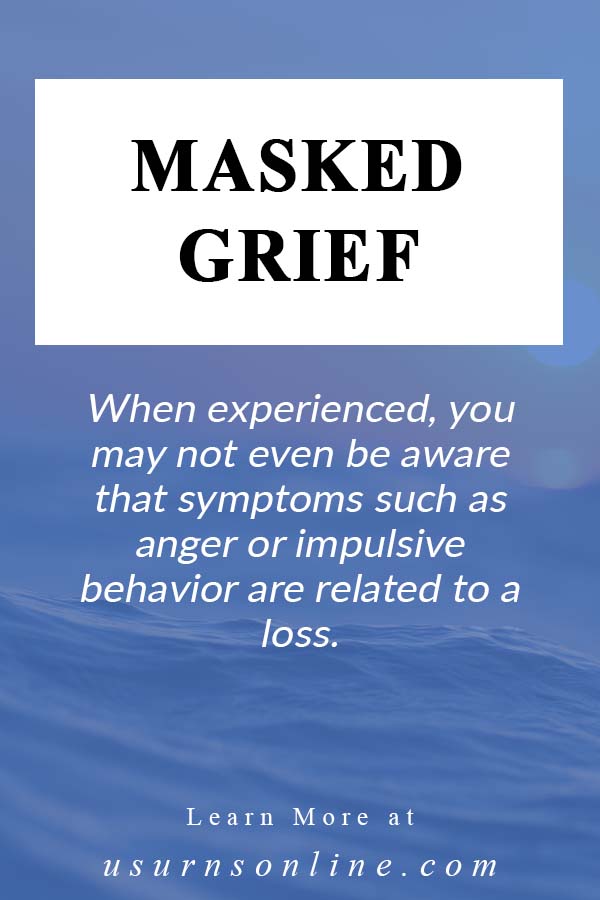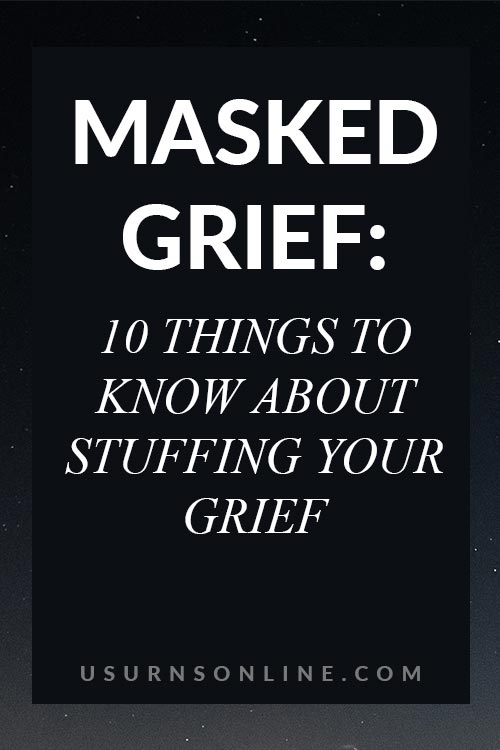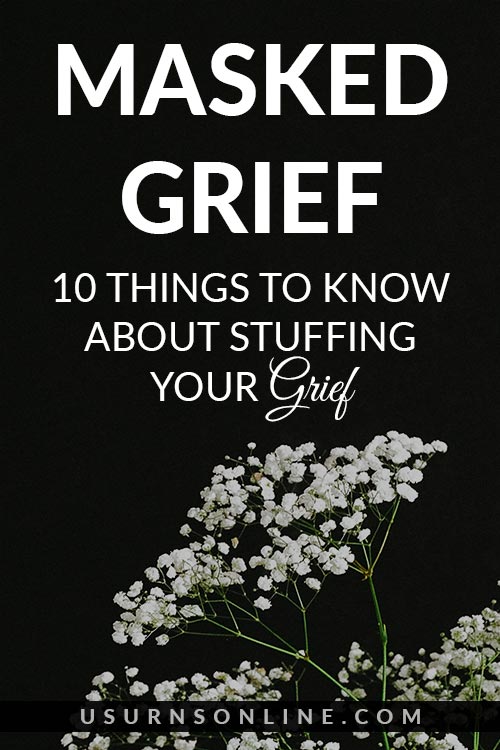Masked grief can be a severe form of grief and may require counseling to deal with it.
Everyone has their way of dealing with grief, whether they accept their grief and deal with it or push their grief aside.
How do you handle grief? Do you let it out and start to heal, or do you suppress it and try to heal? Are you masking or “stuffing” your grief? Let’s talk some more about this important topic.
What Is Masked Grief?
Masked grief is a form of complicated grief. This type of complication arises when you decide to push your feelings down. You suppress your grief and mask it with what you perceive to be more “normal” behavior.
There are many reasons why people will mask their grief. Some of the most common reasons for this center around suffering a traumatic event that no one else can know about.
But even though you try to suppress or cover it, your emotions will come out somehow. Masked grief causes reactions that may impair everyday functioning. Symptoms are often masked as physical symptoms or abnormal behaviors. You may have a hard time relating your grief to your symptoms or behaviors.

When Is It OK to Suppress Your Grief?
It is really never healthy to suppress your grief. You need to find a way to manage your emotions, but suppression shouldn’t be an option.
For instance, no one wants to burst into tears in the workplace or at the grocery store. That’s normal. The difference is when you never let your guard down and allow grief to happen.
Grief is an essential response to a loss, not just death. Even a “subtle” loss can cause grief. Some examples would be moving from one state to another, changing jobs, even graduating from school. It is beneficial to grieve over the loss of something.
What Happens When We Don’t Grieve?
“What’s wrong with me? I don’t seem to be grieving for my loved one!” These thoughts happen more often than you might realize. This condition is relatively common, but rarely talked about.
Urns Made in the USA
When people don’t grieve, it can lead to complicated grief. Tamping your feelings down and avoiding them will only lead to more problems. Emotional and physical issues will manifest eventually.
10 Things to Know About Masked Grief
Taking care of yourself while grieving can seem nearly impossible. But when you suppress your grief it makes taking care of yourself and others worse. Learn to grieve in a healthy way.
1. Finding acceptance requires a journey.
You have to go through the stages of grief. Stuffing your grief down and ignoring it will not help you in the long run. This behavior is considered masking your grief. And masked grief will show up in some other (and almost always unhealthy) way.
No matter why masked grief is occurring, it can be dangerous.
2. Men are often affected by masked grief.
Masked grief shows up in men more than women. Too often, from boyhood on, a man is told, “man up; boys don’t cry; suck it up.” Telling kids this will teach them to suppress emotions. Grown-ups have been telling boys this sort of thing forever. Unfortunately, this harms a child and a man.
For some reason, crying is considered a weakness. But the truth is the exact opposite: crying helps us heal.
So, gentlemen, if you have been told this over the years, forget it! Crying is a healthy outlet!
3. Masked grief manifests in physical ways.
Masked grief will manifest in headaches, stomachaches, sleeplessness, heartburn, and changes in appetite. You may also suffer from frequent occurrences of illness.
If you visit a doctor after a loved one’s death, let them know you are grieving. Your grief could cause your ailment. It will help your doctor to make a diagnosis more quickly.
4. You (and your grief) are not a burden.
There are an unlimited amount of reasons why people choose to cover up their grief.
When you are grieving, you often may feel like you are a burden to others. You think you are making people uncomfortable around you. Friends and family may ask, “How are you?” and instead of being truthful and letting them know, you opt to say, “I’m fine.”
Honestly, when you are raw with grief, it is ok to be “selfish.” Accept people’s offers to help you. Admit you are in a bad place. Take people up on their offers of help. Let someone pick up your kids from school, mow your yard, vacuum your house, and any other number of things.
5. There is help for masked grief.
There are many ways to work through the process of grieving. Masked grief is not typical, but it is a recognized type of grief. You could possibly need to get help from a professional. There is no shame in reaching out to a counselor or a therapist.
Talking to someone about how you handle your grief will also open the door for handling it better the next time around. Getting help now will get you on the right path for the rest of your life.
6. Masked grief attempts to hide emotional symptoms, but ends up causing them anyways.
Grief is emotionally exhausting. You may feel guilt, anger, sadness, and detachment. Most people will feel detachment or even numbness in the first days of grief.
But if you aren’t expressing these emotions, they will only multiply and cause you more problems.
7. Holding in your emotions just changes how they come out.
Instead of grieving, you may indulge in overeating, drinking, compulsive shopping, excessive sex, or drinking. Some people will not even realize why these behaviors are surfacing.
Instead of appearing sad, you might have a happy go lucky attitude. Instead of taking time off work to grieve and be with family, you might pour yourself into workaholism. These types behaviors come into play when you haven’t allowed yourself to grieve.
8. Don’t let COVID-19 be your excuse to avoid grief.
With the COVID-19 pandemic, everything has changed. Everything. With the pandemic, anxiety has increased. Your routine has been interrupted. Getting back to “normal” is one of the things that can help you work through grief.
Unfortunately, “normal” seems a long way off right now. Grief has interrupted you, and so has COVID-19.
Your only choice could be the internet or the phone to talk to a counselor in times like this. The added stress of this “new normal” on top of your grief can make you feel trapped. It is best to be aware of your moods and emotions, but honestly, this isn’t always possible, especially when alone.
9. Grief is a part of life, and isn’t always about death.
Grief is about life as well as death. You can mask your grief over something that has “happened” to you. Life circumstances can be hard to deal with by yourself. We can (and should) grieve those things, too.
And just as easily we can stuff the grief we need to process:
- The loss of a friendship with someone that you weren’t “supposed” to be friends with. This could be a social outcast, a lover, or anyone and anything else society has deemed unacceptable.
- A job offer fell through. You might be too embarrassed to share this with friends or family.
- You’ve lost your house or vehicle. Feelings of shame may hold you back from sharing.
There are many reasons we grieve. But stuffing it down and holding it back are never good options. If you can’t talk to friends or family, talk to a counselor.
10. Here are some first steps to help yourself recover from masked grief.
- Get in touch with your feelings. Not everyone will grieve as you do, and that is OK. Whether you cry, get angry, break things, or none of these is alright.
- Grieving has no set time-line. Too many people think that a single year is enough time to heal. You may not even begin to heal until after that first year is over.
- Talk about your loved one. Remember them, and honor their memory. It is okay to speak of the dead. When someone dies, it doesn’t erase the life you shared or the love you had for them. Talk and be heard!
- Time does not heal all wounds. Time will soften the wound. Give yourself time to heal. You will live with grief for the rest of your life, but you won’t be actively grieving for the rest of your life.
Eventually, you will learn to move forward. You will learn to be happy again. You won’t forget your loved one, and no one is expecting you to.
If you feel like counseling isn’t for you, try something else. Exercise is a healthy way to work through emotions. Art, music, journaling, and even animal therapy might be something that will help you. Here are 44 creative and useful self-care tips to help you while mourning.
Take an active part in your grief. Don’t deny you are going through it. Recognizing grief for what it is will be the first step to helping you through the journey.
Other Types of Grief
There are other types of grief people need to work on. Below is a list worth looking into if you or anyone you know is grieving.
- Abbreviated Grief
- Absent Grief
- Anticipatory Grief
- Chronic Grief
- Collective Grief
- Complicated Grief
- Cumulative Grief
- Delayed Grief
- Disenfranchised Grief
- Distorted Grief
- Exaggerated Grief
- Inhibited Grief
- Normal Grief
Read Next: 22 Honest Quotes about Grief
Pin It





